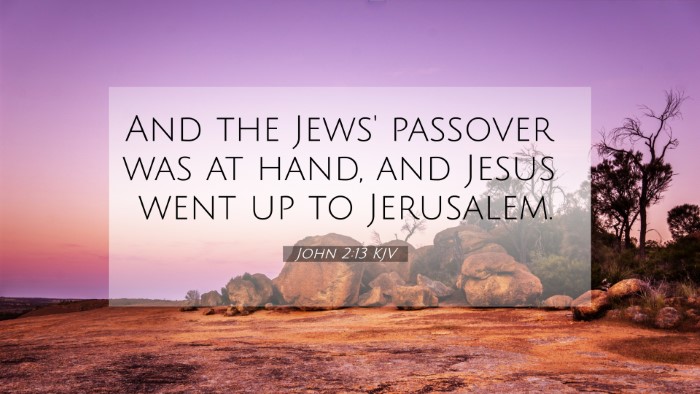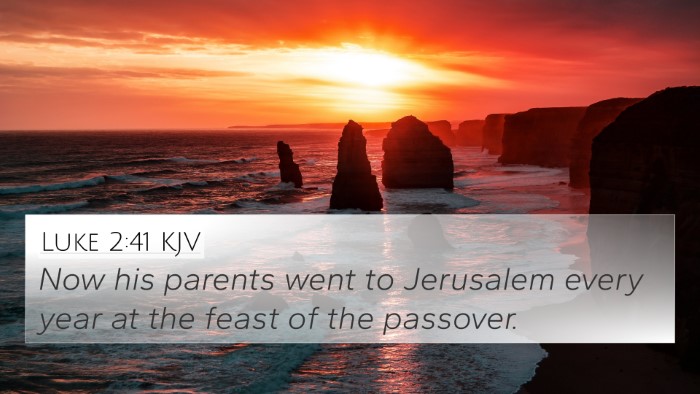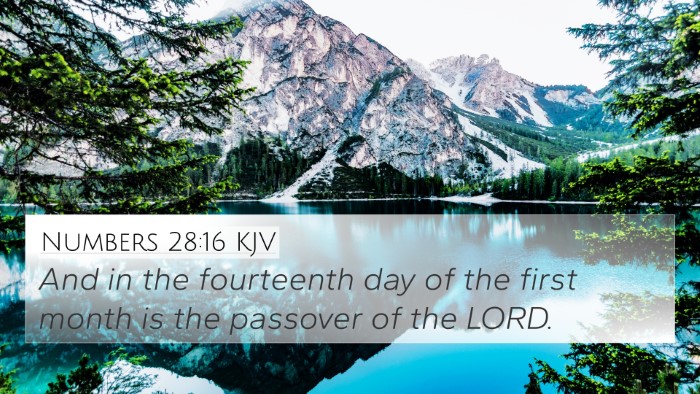Old Testament
Genesis Exodus Leviticus Numbers Deuteronomy Joshua Judges Ruth 1 Samuel 2 Samuel 1 Kings 2 Kings 1 Chronicles 2 Chronicles Ezra Nehemiah Esther Job Psalms Proverbs Ecclesiastes Song of Solomon Isaiah Jeremiah Lamentations Ezekiel Daniel Hosea Joel Amos Obadiah Jonah Micah Nahum Habakkuk Zephaniah Haggai Zechariah MalachiJohn 2:13 Similar Verses
John 2:13 Cross References
And the Jews' passover was at hand, and Jesus went up to Jerusalem.
Uncover the Rich Themes and Topics of This Bible Verse
Listed below are the Bible themes associated with John 2:13. We invite you to explore each theme to gain deeper insights into the Scriptures.
John 2:13 Cross Reference Verses
This section features a detailed cross-reference designed to enrich your understanding of the Scriptures. Below, you will find carefully selected verses that echo the themes and teachings related to John 2:13 KJV. Click on any image to explore detailed analyses of related Bible verses and uncover deeper theological insights.
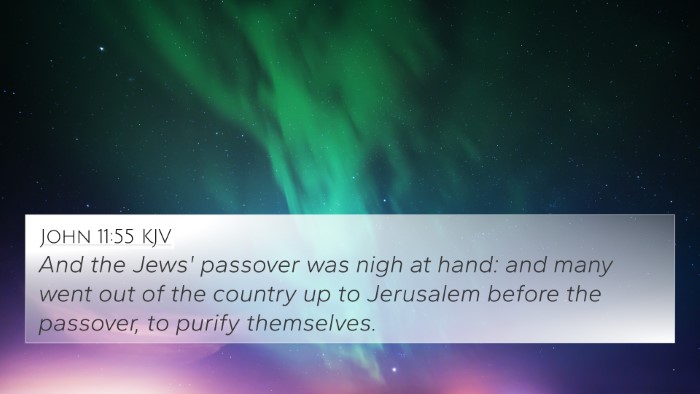
John 11:55 (KJV) »
And the Jews' passover was nigh at hand: and many went out of the country up to Jerusalem before the passover, to purify themselves.

John 2:23 (KJV) »
Now when he was in Jerusalem at the passover, in the feast day, many believed in his name, when they saw the miracles which he did.
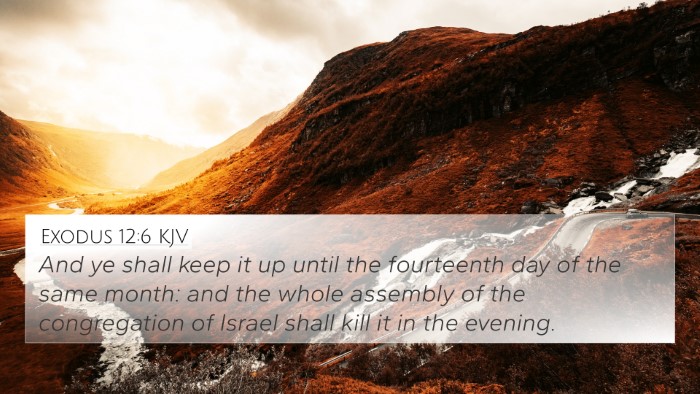
Exodus 12:6 (KJV) »
And ye shall keep it up until the fourteenth day of the same month: and the whole assembly of the congregation of Israel shall kill it in the evening.

Deuteronomy 16:1 (KJV) »
Observe the month of Abib, and keep the passover unto the LORD thy God: for in the month of Abib the LORD thy God brought thee forth out of Egypt by night.
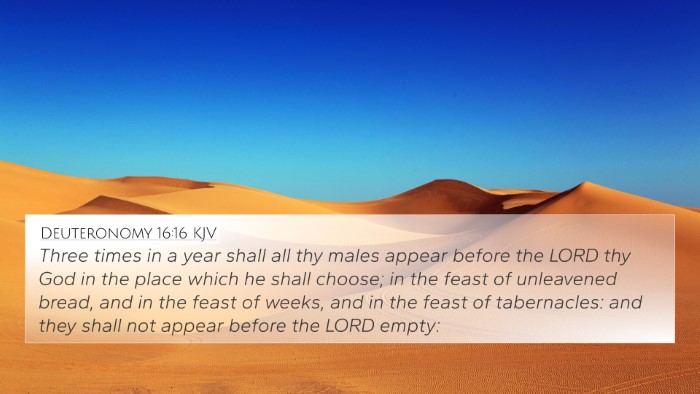
Deuteronomy 16:16 (KJV) »
Three times in a year shall all thy males appear before the LORD thy God in the place which he shall choose; in the feast of unleavened bread, and in the feast of weeks, and in the feast of tabernacles: and they shall not appear before the LORD empty:
John 2:13 Verse Analysis and Similar Verses
Understanding John 2:13
In the Gospel of John, chapter 2, verse 13, we encounter a powerful narrative that serves to illustrate the zeal of Jesus for pure worship and the seriousness with which He treats the sanctity of the Temple. This moment marks the beginning of Jesus's public ministry and underscores the theme of divine authority.
Verse Context
John 2:13 states: "And the Jews' passover was at hand, and Jesus went up to Jerusalem." This event occurs during Passover, a significant Jewish festival that commemorates the Israelites' exodus from Egypt. The timing of this incident highlights the importance of the Temple as a center of worship and the need for reverence within its walls.
Thematic Analysis
From the commentaries of Matthew Henry, Albert Barnes, and Adam Clarke, we gather various insights:
- Matthew Henry: He emphasizes the zeal of Christ in purifying the Temple and reprimanding those who had turned it into a marketplace. This act serves as a prophetic declaration of the need for true worship, free from commercialism and distraction.
- Albert Barnes: Barnes notes the importance of this event in demonstrating the authority of Jesus. His actions reveal the nature of His ministry, which is to restore both the worship of God and the integrity of the Temple.
- Adam Clarke: Clarke discusses the implications of Jesus's actions, pointing to the broader spiritual meaning of cleansing—both the Temple and the hearts of believers, calling for an inward reverence in addition to outward compliance with religious duties.
Bible Verse Cross-References
John 2:13 can be related to several other scriptures that provide further insight into the themes of worship, zeal, and authority. These include:
- Exodus 30:12-16: Discusses the significance of the temple and the offerings to be made, emphasizing the need for purity in worship.
- Matthew 21:12-13: Relates to Jesus's cleansing of the temple, mirroring the actions taken in John 2:13.
- Mark 11:15-17: Further accounts of the temple cleansing that reveal the seriousness of the offense committed by the merchants.
- Luke 19:45-46: Similar narrative regarding the Temple’s desecration and Jesus's response.
- Isaiah 56:7: Refers to the Temple as a house of prayer for all nations, underscoring its intended purpose.
- Jeremiah 7:11: Expresses the Lord's disdain for those who desecrate the temple through unjust practices.
- John 4:24: Jesus speaking on true worship in spirit and truth, connecting to the theme of genuine worship in John 2:13.
Comparative Bible Verse Analysis
This verse serves as a bridge to understanding Jesus's mission more deeply. The act of cleansing the temple is indicative of a larger spiritual cleansing He brings to humanity. The synoptic Gospels provide parallel accounts of the same event, which allows for a comparative study of Biblical themes.
Connections Between Bible Verses
The connections here illustrate a broader narrative about Jesus's identity as the Messiah and His mission to restore relationship and access to God.
How to Use Bible Cross-References
By employing tools for Bible cross-referencing, such as concordances and reference guides, readers can uncover deeper meanings and thematic links in scriptures. Tools like the Bible cross-reference guide and Bible reference resources are invaluable for serious study.
Conclusion
In summary, John 2:13 is not merely a historical account but a profound allegory of spiritual purity and worship that transcends the boundaries of its immediate context. By engaging with comparative analyses, engaging with cross-references, and seeking thematic links, one can gain a holistic understanding of this pivotal moment in Christ's ministry. Believers are encouraged to reflect on the need for integrity in worship within their own lives and communities.
Further Study Suggestions
Consider how this event correlates with your understanding of God’s house and the call for holiness in your own life. As you explore these connections, reflect on the broader implications of Jesus's actions during Passover and engage deeply with the text.


